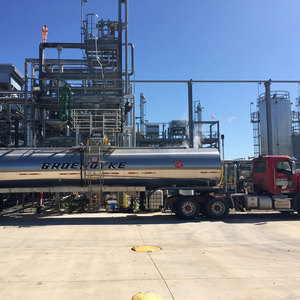Oklahoma cellulosic diesel facility achieves D7 Q-RIN status




Velocys plc
March 15, 2018
BY Ron Kotrba
Advertisement
Advertisement
Related Stories
The Transport Project and Coalition for Renewable Natural Gas (RNG Coalition) on April 24 announced that 79%of all on-road fuel used in natural gas vehicles in calendar year 2023 was RNG surpassing the previous year’s record-breaking level.
Vertimass on April 23 announced that the U.S. EPA has approved registration for blending up to 20% of Vertimass green gasoline with conventional gasoline. This new renewable gasoline product, VertiGas20, is made from renewable ethanol.
Origin Materials on April 3 announced the successful conversion of wood residue feedstock, such as wood chips, shavings and sawdust, into sustainable intermediates at Origin 1, its first commercial-scale plant.
Neste and New Jersey Natural Gas have announced NJNG will fuel its medium-duty trucks and associated equipment with Neste MY Renewable Diesel to help reduce greenhouse gas (GHG) emissions.
Meridian Energy Group Inc., the developer of a proposed greenfield oil refinery in Belfield, North Dakota, on April 16 announced that the facility will have the ability to co-process up to 4,000 barrels per day vegetable oil.





